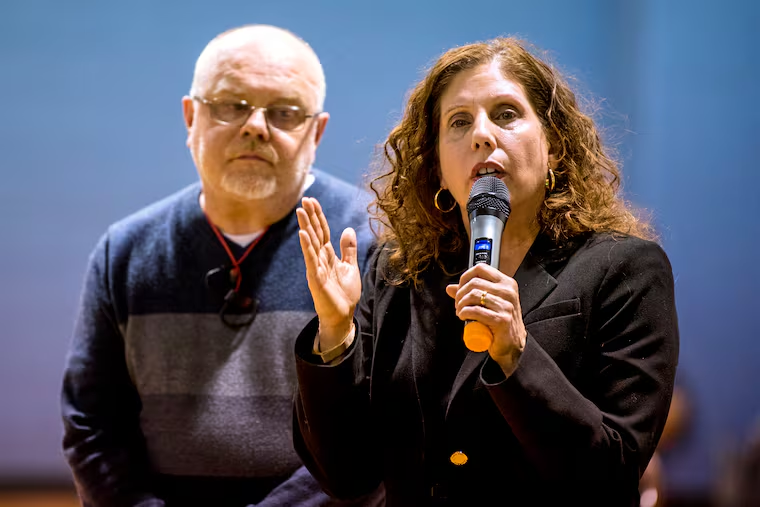Philly’s supervised injection site nonprofit gets tax-exempt status from IRS
Safehouse officials said gaining tax-exempt status lends the organization legitimacy from the federal government, even as another arm of the government is seeking to block it from opening.

Safehouse, the nonprofit hoping to open a supervised injection site in Philadelphia, has been granted tax-exempt status by the Internal Revenue Service, according to documents obtained by The Inquirer.
The move exempts the organization from federal income taxes, and also allows donors to deduct contributions to Safehouse from their own federal taxes.
Safehouse officials said gaining tax-exempt status lends the organization legitimacy from the federal government, even as another arm of the government is seeking to block it from opening. The nonprofit is facing a federal lawsuit from the Department of Justice.
“We have heard from many generous people about this, concerned about whether they can safely donate money,” said Ronda Goldfein, Safehouse’s vice president and the executive director of the AIDS Law Project of Pennsylvania. “I hope this will give potential funders a level of comfort. The IRS has looked at our very clear purpose -- we have said clearly there will be supervised injection, and we haven’t tried to be anything less than candid. And the IRS has granted this as a lawful public charity.”
An IRS spokeswoman said that, by law, the agency could not comment on individual organizations. But the agency’s website says a charity can lose its tax-exempt status if it engages in “purposes or activities that are illegal or violate fundamental public policy."
Whether supervised injection sites -- where people in addiction can inject drugs under medical supervision, be revived if they overdose, and access treatment -- are legal is the subject of the DOJ lawsuit.
U.S. Attorney William McSwain has argued that supervised injection sites are illegal, because a 1986 federal law makes knowingly opening or maintaining any place for the purpose of manufacturing, distributing, or using controlled substances a felony punishable by up to 20 years in prison.
Safehouse’s attorneys have argued that the law, co-sponsored by former Delaware senator Joe Biden and known colloquially as the “crackhouse statute," was never intended to block legitimate public-health interventions, and wrote in their application for tax-exempt status that overdose prevention and harm-reduction services are legal.
A supervised injection site, they say, is necessary to save lives amid one of the worst urban opioid crises in the country: More than 3,000 people have died of drug overdoses in Philadelphia in the last three years.
It’s unclear what impact Safehouse’s new status will have on the federal lawsuit. Representatives for McSwain did not immediately comment on the decision.
“I think it is important for the court to know that a federal agency has looked at this activity and determined that it’s lawful,” said Goldfein, who is married to Inquirer editor David Lee Preston.
In their application to the IRS, filed in September, Safehouse board members wrote that they planned to open an “overdose prevention site" in Philadelphia and asked the IRS to review their application as soon as possible because the organization was “formed to mitigate a national health crisis which is hitting residents of the City of Philadelphia particularly hard."
They explained that they would operate a “medically supervised safe consumption room," and give visitors access to clean syringes and referrals to addiction treatment, counseling, medical, and housing services. The application also noted that staffers would “provide for medical observation of injection” and wouldn’t handle or distribute any drugs at the site.
They added that they planned to open their first site in Kensington or Fairhill, “the epicenter of the city’s heroin/fentanyl problem and of fatal drug overdoses.”
The application also included estimates on the nonprofit’s potential revenue and expenses. Safehouse estimated revenues of more than $2 million in its first year, and $1.8 million in expenses. Goldfein said that, after months of planning and talking to potential contributors, she believes those expenses will likely be lower.
“This is not an expensive intervention,” she said. “It’s primarily staff -- we’re not envisioning expensive equipment. We feel like we can do it for less money than we originally projected.”
She said a site that would be open five days a week and operating on eight-hour shifts would likely cost the organization $830,315 in its first year. A 24-hour site operating seven days a week would cost $1.2 million in the first year, she said.
One question is whether Safehouse will have to purchase a building or pay rent. The nonprofit has been offered a rent-free space on Hilton Street in Kensington, but has not signed a lease -- and after community outcry over the site, Mayor Kenney said the city must develop a public safety plan before a site can open.